Related Research Articles

Julian was Roman emperor from 361 to 363, as well as a notable philosopher and author in Greek. His rejection of Christianity, and his promotion of Neoplatonic Hellenism in its place, caused him to be remembered as Julian the Apostate in Christian tradition.
The Julian day is the continuous count of days since the beginning of the Julian period, and is used primarily by astronomers, and in software for easily calculating elapsed days between two events.
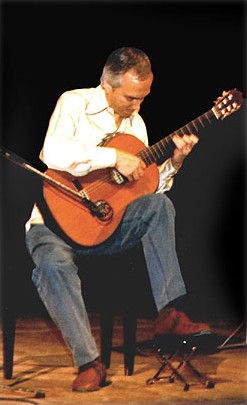
John Christopher Williams is an Australian virtuosic classical guitarist renowned for his ensemble playing as well as his interpretation and promotion of the modern classical guitar repertoire. In 1973, he shared a Grammy Award in the Best Chamber Music Performance category with fellow guitarist Julian Bream for Together. Guitar historian Graham Wade has said that "John is perhaps the most technically accomplished guitarist the world has seen."
William Southcombe Lloyd Webber was an English organist and composer, who achieved some fame as a part of the modern classical music movement whilst commercially facing mixed opportunities. Besides his long and prestigious career, composing works ranging from choral pieces to instrumental items and more, he is known for being the father of both fellow composer Andrew Lloyd Webber and virtuoso cellist Julian Lloyd Webber. He also notably served as a teacher, instructing pupils on music theory at the Royal College of Music for many years until his death in 1982.

Julian Lloyd Webber is a British solo cellist, conductor and broadcaster, a former principal of Royal Birmingham Conservatoire and the founder of the In Harmony music education programme.

The narthex is an architectural element typical of early Christian and Byzantine basilicas and churches consisting of the entrance or vestibule, located at the west end of the nave, opposite the church's main altar. Traditionally the narthex was a part of the church building, but was not considered part of the church proper.

Julian Alexander Bream was an English classical guitarist and lutenist. Regarded as one of the most distinguished classical guitarists of the 20th century, he played a significant role in improving the public perception of the classical guitar as a respectable instrument. Over the course of a career that spanned more than half a century, Bream also helped revive interest in the lute.
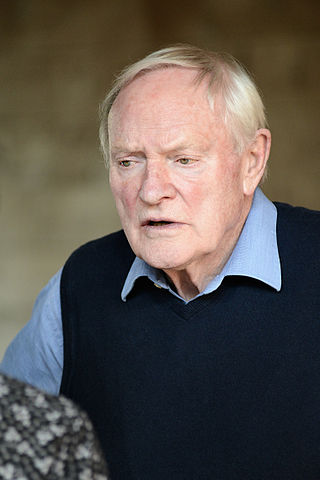
Julian Wyatt Glover is an English classical actor with many stage, television, and film roles since commencing his career in the 1950s. He is a recipient of the Laurence Olivier Award and has performed many times for the Royal Shakespeare Company.
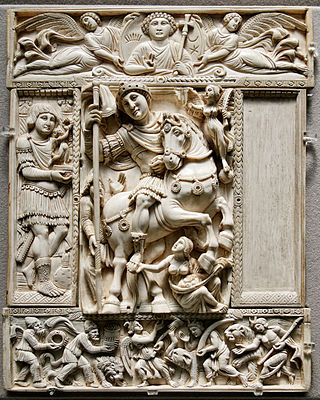
Late antiquity is the time of transition from classical antiquity to the Middle Ages, generally spanning the 3rd–7th century in Europe and adjacent areas bordering the Mediterranean Basin. The popularization of this periodization in English has generally been credited to historian Peter Brown, after the publication of his seminal work The World of Late Antiquity (1971). Precise boundaries for the period are a continuing matter of debate, but Brown proposes a period between the 3rd and 8th centuries AD. Generally, it can be thought of as from the end of the Roman Empire's Crisis of the Third Century (235–284) to the early Muslim conquests (622–750), or as roughly contemporary with the Sasanian Empire (224–651). In the West, its end was earlier, with the start of the Early Middle Ages typically placed in the 6th century, or earlier on the edges of the Western Roman Empire.
David Russell is a classical guitarist. He is considered a virtuoso with a captivating stage presence, impeccable tone, technical mastery over his instrument, and a soft spoken dedication to advancing the craft of classical guitar. Although he has a wide collection of instruments, he is most known for his association with Matthias Dammann guitars and D’Addario Pro-Arte’ Nylon strings.

Julian Stockwin MBE is an author of historical action-adventure fiction. As well as the Kydd Series he has written two standalone novels The Silk Tree and The Powder of Death.
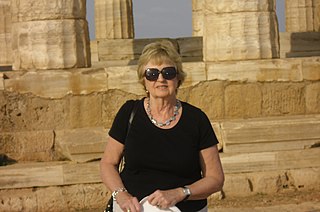
Dame Averil Millicent Cameron, often cited as A. M. Cameron, is a British historian. She is an expert on Late Antiquity, Classics, and Byzantine Studies. She was Professor of Late Antique and Byzantine History at the University of Oxford, and the Warden of Keble College, Oxford, between 1994 and 2010.

Hypaepa or Hypaipa was an Ancient city and (arch)bishopric in ancient Lydia, near the north bank of the Cayster River, and 42 miles from Ephesus, Ephesus and remains a Latin Catholic titular see.

The Byzantine Empire was the continuation of the Roman Empire when Constantinople was its centre, which spanned from late antiquity to the medieval period. Collectively, the term Eastern Roman Empire refers to the imperial court that controlled the eastern administration—ordinarily from 364 onward, and lasted until the fall of Constantinople in the mid-fifteenth century. During most of its existence, the empire remained the most powerful economic, cultural, and military force in the Mediterranean world. Its citizens continued to refer to their empire as the Roman Empire and to themselves as Romans—a term which Greeks continued to use for themselves into Ottoman times. Modern historians distinguish the Byzantine Empire from the earlier Roman Empire due to the imperial seat moving from Rome to Byzantium, the Empire's integration of Christianity, and the predominance of Greek instead of Latin.

Solon J. Hadjisolomos is a Cypriot musicologist.
Julian Bliss is a British clarinettist and clarinet designer. He has performed as a soloist, chamber and jazz musician, notably with his teacher Sabine Meyer. He also designed the Bliss Clarinet for instrument manufacturer Leblanc.

Byzantine Empire under the Constantinian and Valentinianic dynasties was the earliest period of the Byzantine history that saw a shift in government from Rome in the West to Constantinople in the East within the Roman Empire under emperor Constantine the Great and his successors. Constantinople, formally named Nova Roma, was founded in the city of Byzantium, which is the origin of the historiographical name for the Eastern Empire, which self-identified simply as the "Roman Empire".
Julian, Count of Ceuta (Spanish: Don Julián, Conde de Ceuta,, Arabic: يليان, was, according to some sources, a renegade governor, possibly a former comes in Byzantine service in Ceuta and Tangiers who subsequently submitted to the king of Visigothic Spain before secretly allying with the Muslims. According to Arab chroniclers, Julian had an important role in the Umayyad conquest of Hispania, a key event in the history of Islam, and in the subsequent history of what were to become Spain and Portugal.
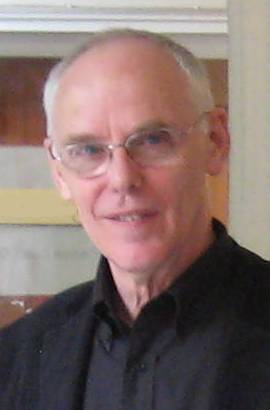
Julian Bicknell is a British architect.

Athanasios Angelou is a Greek university teacher of Byzantine Literature, and has served as Dean of the School of Philosophy at the University of Ioannina and Artistic Director of cultural presentations.
References
- ↑ Page, Tim (27 January 1986). "Concert: Julian Byzantine". The New York Times . Retrieved 27 December 2009.
- ↑ "Julian Byzantine - A Short Biography". Bach Cantatas. Retrieved 12 November 2013.